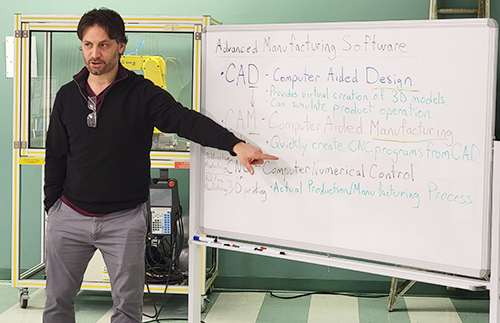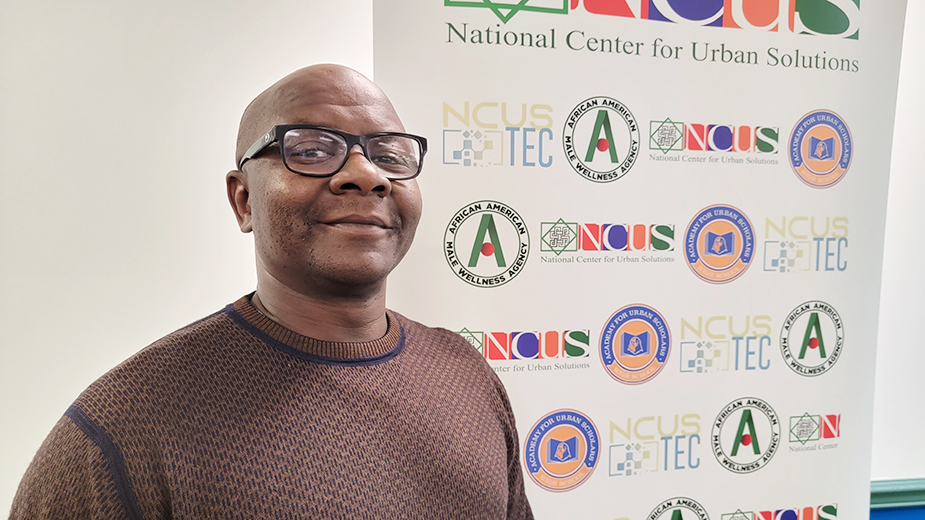YOUNGSTOWN, Ohio – The National Center for Urban Solutions is tapping into an underdeveloped workforce to reinvent Youngstown by investing in those shut out of the labor market.
The center found a home downtown two years ago. Since then it has established itself as a workforce development leader. Its workforce manager, Wasilwa Mwonyonyi, says the center is aiding in the effort to put the city on a path to prosperity.
“We’re trying to knock the rust off. We’re trying to turn it into the tech belt. We want to find the untapped workforce,” Mwonyonyi says. ”And sometimes there’s a unique process doing it.”
The National Center for Urban Solutions (NCUS) is the recipient of The Business Journal’s inaugural Brain Gain Excellence Award for workforce development. The awards program is an extension of our Brain Gain franchise to recognize the top workforce development initiatives and fresh new business ideas in the region.
SERVICES AND PROGRAMS
The National Center for Urban Solutions, founded by Youngstown native John Gregory, has served the urban community over 20 years, moving individuals mired in urban poverty to self-sufficiency.
The center has built a national reputation through its grassroots philosophy. Urban Solutions has had its programs recognized locally, by the city of Columbus, nationally by the White House under former Presidents Bill Clinton and George Bush, and by the departments of Labor and Housing and Urban Development as a best practice model.
The core competencies of the National Center for Urban Solutions focus on workforce development, education and health and wellness. Through its innovative programs, it has moved over 13,000 individuals off public assistance, upskilled thousands of African American men and women to high-demand employment and enrolled hundreds of urban youth to study for their high school diplomas.
Since its inception, 15,000 individuals have gained employment and 50,000 people have been connected with health and wellness training across 12 cities. The National Center for Urban Solutions operates from four service centers: Youngstown, Columbus, Pittsburgh and Philadelphia.
The center focuses on job readiness training through the Academy for Urban Scholars and also manages the African American Male Wellness Agency and NCUS Tec.
Mwonyonyi is a job readiness trainer at the Youngstown service center. There, residents learn soft skills how to build a résumé and how to do well in a job interview. Urban Solutions also partners with other organizations and companies for their recruiting needs.
Alex Hertzer, assistant director of the Mahoning Valley Manufacturers Coalition, nominated Urban Solutions for the Brain Gain Excellence Award because of the role the center plays in the success of its initiative, WorkAdvance.
WorkAdvance is MVMC’s workforce development initiative that seeks to identify, recruit, train, place for employment, improve the skills, and provide ongoing career coaching to individuals – many of whom are from underrepresented demographics – in the manufacturing industry who are either unemployed or underemployed.
“Nearly all of MVMC’s 50-plus local member-manufacturer organizations are in need of workers, and with the labor market as tight as it is, a fresh approach to identifying ‘hidden’ workers was needed,” Hertzer says. “It was critical to engage a partner with grassroots marketing acumen, community connections and career coaching resources to bring it to fruition. And for MVMC, that partner proved to be NCUS.”
Nearly 200 people have gone through WorkAdvance and many have been placed in good-paying, upward-mobile manufacturing jobs with Mahoning Valley employers, Hertzer says.
“These participants are recruited by NCUS outreach staff who literally knock on doors in neighborhoods,
visit schools, attend church services and community events; literally meeting people where they are,” Hertzer says. “Once they get them in the door, they hold them accountable, help them remove obstacles to employment, encourage them, believe in them, and help them realize their full potential.”
The Academy for Urban Scholars moved into Urban Solutions’ site on East Boardman Street a year ago. In addition to workforce training and helping with building résumés and job placement, the academy provides adults the opportunity to earn either a high school diploma or General Educational Development diploma.
The academy also operates a high school on Market Street. Its mission is to produce work-ready, college-ready, caring, articulate, critical thinkers and lifelong learners, who are socially responsible, resilient, and productive citizens in a diverse community.
The mission of the African American Male Wellness Agency is to increase the life expectancy of African American men through physical health, mental health, financial health, fatherhood and research. The program is part of Urban Solutions’ mission to rehabilitate the whole person, therefore making its participants reliable and productive workers.
The agency created the Real Men Real Talk community conversation series and annual conference to provide safe spaces for mental health disclosure and healing.
Real Talk provides men the opportunity to express feelings, be vulnerable, and talk about their families, wellbeing, family life and lifestyle.

NCUS Tec provides three credential pathways to careers in advanced manufacturing, IT and health care. It offers courses to high school students as well as adults that lead to certifications.
Steve Pownell, the advanced manufacturing instructor at NCUS Tec, says the program gets students up to speed on the basics as well as the new technology coming into the area.
“Ohio is doing a lot of work to bring in more manufacturing and build that base. The companies are coming here because they believe that the workforce is here and they see us as bringing the underrepresented workforce,” Pownell says. “We’re trying to represent people who have been overlooked and bring them up to speed.”
‘GIVING A LEG UP’
Hidden workers make up the untapped workforce that Urban Solutions is tapping in to. It defines hidden workers as career switchers from nonmanufacturing jobs, unemployed/underemployed, women, people of color, formerly incarcerated individuals and veterans. These individuals lack access to many job opportunities because of social, economic and financial barriers.
“People have child-care issues. People may have backgrounds that are undesirable. But we have second-chance employers,” Mwonyonyi says. “There are companies and industries, not just in manufacturing, that will work with them and give them a chance. So, sometimes it’s just removing some of those barriers.”
The grassroots philosophy at NCUS means its staff meets people where they are – knocking on doors, attending church and school events, and generally pounding the pavement to spread the word about the center and available resources.
Meeting people where they are goes beyond their locations, Pownell says. “Life is tough,” he says.
“Young people are in situations that had nothing to do with them sometimes and it makes it hard to get a leg up and get solid ground under their feet. We try to be there for them in all the ways that we can and give them a little bit of extra room,” he says. “We meet them where they are so we can help them forward.”
BUILDING THE WORKFORCE
Mwonyonyi says the spirit of the Mahoning Valley is being noticed and he hopes to spread it nationwide. He wants to expand the center to cover northeastern Ohio and then scale it statewide and eventually nationally.
The National Center for Urban Solutions has made great strides in its two years of operation in the city, Mwonyonyi says, and he credits that to relationship building. He believes relationships are the key to a prosperous future for Youngstown.
“We need progressive thinking from other people that recognize what we’re doing and that we can work together. It’s not just us,” he says. “Relationships are what this community has been lacking sometimes. People kind of operate in silos. Everyone could come to the table and exchange ideas. One person is not smarter than everybody.”
More programs might be coming, Mwonyonyi says. He has hopes of expanding with training programs in construction and health care.
“Technology is everywhere, and manufacturing – everything is built somewhere. With health care, people are always going to get sick and there is always going to be someone to take care of them,” he says.
Mwonyonyi wants NCUS to become synonymous with job training.
“That’s the goal: make the National Center for Urban Solutions a household name,” he says.
Pictured at top: Wasilwa Mwonyonyi says the National Center for Urban Solutions reaches out to hidden workers.
